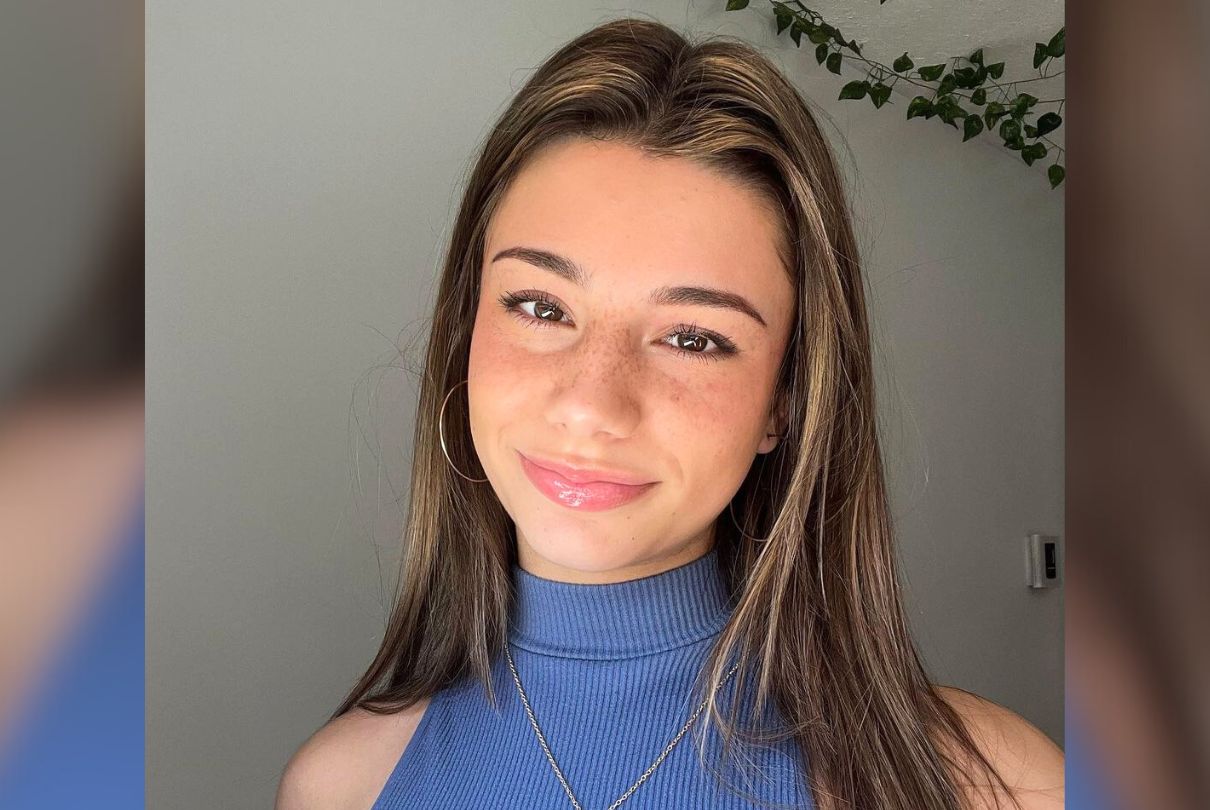When it comes to Mikayla Campinos leaks, the internet is buzzing with curiosity and questions. In today's world of social media and online content, incidents like this often spark debates about privacy, consent, and the digital footprint we leave behind. If you're here because you want to understand what's happening and why it matters, you're in the right place.
Let’s face it, folks. The internet can be wild sometimes. Whether it’s celebrity drama, viral trends, or controversial topics, there’s always something that grabs our attention. Mikayla Campinos leaks have been making waves online, and we’re here to break it down for you in a way that’s both informative and respectful.
Before we dive deep into the details, let’s establish one thing: this article isn’t about sensationalizing or spreading rumors. Instead, we’ll focus on understanding the context, exploring the implications, and discussing the bigger picture. So, buckle up, because we’re about to take you on a ride!
Read also:Is Nf Married Exploring The Personal Life Of The Rapping Sensation
Now, let’s get into the nitty-gritty. Here's a quick guide to what you'll find in this article:
- Mikayla Campinos Biography
- What Are the Mikayla Campinos Leaks?
- Legal Implications of Content Leaks
- Privacy Concerns and Digital Footprints
- The Impact on Social Media Platforms
- How Technology Plays a Role
- Tips for Preventing Leaks
- Ethical Considerations
- Public Reaction and Media Coverage
- Wrapping It All Up
Mikayla Campinos Biography
Before we get into the leaks themselves, it’s important to know who Mikayla Campinos is. Born and raised in a world where social media dominates, Mikayla has built a reputation as a content creator, model, and influencer. Her journey in the digital world is one of many who’ve found fame through platforms like Instagram, TikTok, and YouTube.
Mikayla Campinos Facts
Here’s a quick snapshot of Mikayla’s life:
| Full Name | Mikayla Campinos |
|---|---|
| Date of Birth | Not publicly disclosed |
| Occupation | Influencer, Model, Content Creator |
| Social Media Platforms | Instagram, TikTok, YouTube |
| Notable Achievements | Millions of followers across platforms |
Mikayla’s rise to fame wasn’t just about looks or charm. She’s known for her authenticity, relatability, and ability to connect with her audience. But like many influencers, her life isn’t without its challenges.
What Are the Mikayla Campinos Leaks?
Now, let’s talk about the elephant in the room. The so-called "Mikayla Campinos leaks" refer to unauthorized content that was reportedly shared online without her consent. This could include photos, videos, or other personal materials. The situation has sparked a lot of discussions, and understandably so.
Understanding the Context
Content leaks, especially involving public figures, are not uncommon these days. But what makes this case noteworthy is the scale of attention it’s receiving and the broader questions it raises about privacy and consent. Many people are asking: How did this happen? Who’s responsible? And most importantly, what can we do to prevent such incidents in the future?
Read also:T33nleaks The Buzzing Phenomenon Everyonersquos Talking About
Let’s break it down further:
- Unauthorized Sharing: The leaks involve content that was not meant for public consumption.
- Privacy Violations: This highlights the dangers of sharing sensitive information online.
- Legal and Ethical Issues: It raises questions about the legal ramifications and moral responsibility of those involved.
Legal Implications of Content Leaks
When it comes to leaks, the law can be a tricky territory. In many jurisdictions, sharing private content without consent is illegal. This applies to photos, videos, or any other material that was not intended for public viewing.
Here’s a quick rundown of the legal aspects:
- Copyright Laws: The original content creator holds the rights to their material.
- Privacy Laws: Sharing private content without permission can lead to legal consequences.
- Criminal Charges: In some cases, individuals involved in leaks can face criminal charges.
It’s important to note that laws vary by country, so the specifics can differ depending on where you are. However, the overarching message is clear: respect people’s privacy and seek consent before sharing anything.
Privacy Concerns and Digital Footprints
Let’s talk about the elephant in the room: privacy. In today’s digital age, our lives are increasingly intertwined with technology. From social media profiles to cloud storage, we leave a trail of data wherever we go. But what happens when that data falls into the wrong hands?
Why Privacy Matters
Privacy isn’t just about keeping secrets. It’s about maintaining control over your personal information. When someone leaks private content, they’re not just violating trust—they’re also exposing you to potential harm. This could include identity theft, cyberbullying, or even financial fraud.
Here’s how you can protect yourself:
- Secure Your Accounts: Use strong passwords and enable two-factor authentication.
- Limit Sharing: Be cautious about what you share online and with whom.
- Stay Informed: Educate yourself about privacy settings and digital security.
The Impact on Social Media Platforms
Social media platforms play a crucial role in how content is shared and consumed. When leaks happen, these platforms are often at the center of the storm. They have a responsibility to act quickly and effectively to remove unauthorized content and protect users.
How Platforms Are Responding
Many social media companies have policies in place to address leaks and privacy violations. For example:
- Content Removal: Platforms can remove leaked content upon request.
- User Education: They provide resources to help users protect their privacy.
- Account Security: Enhanced security measures are often introduced after such incidents.
While these efforts are commendable, they’re not always enough. Users must also take proactive steps to safeguard their information.
How Technology Plays a Role
Technology has revolutionized the way we communicate and share information. But with great power comes great responsibility. The same tools that make our lives easier can also be used for malicious purposes if they fall into the wrong hands.
The Good and the Bad
Here’s a look at both sides of the coin:
- Positive Aspects: Technology enables creativity, connectivity, and innovation.
- Negative Aspects: It can also facilitate leaks, hacking, and other forms of cybercrime.
It’s up to us to use technology responsibly and ensure it serves as a force for good rather than harm.
Tips for Preventing Leaks
Now that we’ve covered the risks, let’s talk about solutions. Preventing leaks starts with being proactive about your digital security. Here are some practical tips:
- Use Strong Passwords: Avoid using common or easily guessable passwords.
- Enable Two-Factor Authentication: Add an extra layer of security to your accounts.
- Be Cautious with Links: Don’t click on suspicious links or download unknown files.
- Regularly Update Software: Keep your devices and apps up to date with the latest security patches.
By taking these steps, you can significantly reduce the risk of becoming a victim of a leak.
Ethical Considerations
Beyond the legal and technical aspects, there’s an ethical dimension to consider. When someone shares private content without consent, they’re not just breaking the law—they’re also violating basic human decency. It’s important to think about the impact of our actions on others.
Respecting Consent
Consent is key. Whether it’s sharing a photo, forwarding a message, or posting something online, always ask for permission first. Respecting someone’s boundaries shows that you value their privacy and dignity.
Here’s how you can practice ethical behavior online:
- Think Before You Share: Consider the potential consequences of your actions.
- Support Victims: If someone has been affected by a leak, offer them support and empathy.
- Speak Up: If you see something unethical happening, don’t hesitate to speak out.
Public Reaction and Media Coverage
The reaction to Mikayla Campinos leaks has been mixed. Some people are quick to judge, while others are more empathetic. The media plays a crucial role in shaping public perception, and how they report on such incidents can have a significant impact.
How the Media Can Help
Here’s what responsible journalism looks like:
- Fact-Checking: Verify information before publishing it.
- Respecting Privacy: Avoid sharing sensitive content without consent.
- Providing Context: Explain the situation in a way that’s informative and respectful.
When the media gets it right, they can help educate the public and promote positive change.
Wrapping It All Up
In conclusion, the Mikayla Campinos leaks have sparked important conversations about privacy, consent, and digital security. While the situation is undoubtedly challenging, it also presents an opportunity to learn and grow as a society.
Here’s what we’ve covered:
- Understanding the context and implications of the leaks.
- Exploring the legal and ethical considerations involved.
- Discussing ways to prevent similar incidents in the future.
As we move forward, let’s commit to using technology responsibly and treating others with respect. If you found this article helpful, feel free to share it with others or leave a comment below. Together, we can create a safer and more respectful online environment for everyone.



